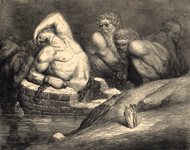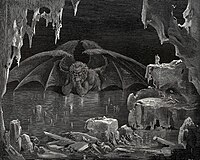In opening Canto XXVII the reader learns that as Dante and Virgil leave Ulysses they come across another comrade of Dante's. This soul recognizes Dante's accent and asks about the state of the Romagnoles. Dante is saddened to deliver the news that this region still suffers under tyranny; however it has not been dragged through war. Dante asks for the identity of the soul and only after the sinner reasons that Dante will never be able to return to earth, does he given in to the request. The living voyager learns of this man, Guido da Montefeltro's, life and how through deceit he believed his sins to be absolved prior to creating them. When faced with the underworld he was at first taken by St. Francis but in turn a demon came to absolve his actions. The demon reasoned with logic that a man can not be absolved of a sin he has yet to commit, thus Guido was thrown into the flame he inhabits. Dante and Virgil then continue on to the ninth pouch.
 |
http://writingcompany.blogs.com/this_isnt_writing_its_typ/
2006/02/should_we_censo.html |
The narrator is befuddled on how to fully explain the gruesome acts that he witnesses in this abyss. He rattles off many different wars that came no where close to the wounds that he observed. Mohammed notices Dante gawking at his wounds and explains how this pouch works. The sinners walk in a circle, at the beginning of the processional they are wounded by a demon with a sword. By the time they walk around the circle their wounds have healed thus forcing them to constantly feel the freshness of a new injury. This pouch is reserved for the Sowers of Scandal and Schism. Their punishment continual splits them open thus relating to their actions on earth. The sinners of this pouch soon learn that Dante will re-surface to earth and many of them ask that he relay messages to their friends and families. In the end Dante is amazed at the sight of a headless man who walks around carrying his lost body part. He identifies this man to be Bertran de Born. The sinner is forced to carry his severed head because he severed the ties between a father and son on earth. In turn he is forced to use his torment as a visual tool for his sin.
Dante continues to gape at the sinners in this pouch. Virgil tries to push the living soul on toward the next section but Dante's curiosity turns his mind back to the ninth pouch. He tells Virgil that he believed that his own ancestor resided in the area and worries about the sinners soul being avenged. Virgil acknowledges these sentiments and tells Dante that because he was so focused on other sinners he missed his opportunity to talk with the ancestor. The guide pushes Dante onward because in order to arrive at their destination they must continue.
The two reach the tenth pouch of the eighth circle that is reserved for Falsifiers. It is separated into four section. The first houses Falsifiers of Metals, also known as Alchemist. Their bodies are covered in scabs that itch so immensely that the souls are constantly scratching at their skin. Dante and Virgil meet some sinners who consider themselves Italian and in order to learn their stories Dante promises to spread their names when he returns to the natural world. The two souls turn out to be Griffolino and Capocchio. They retell their stories to Dante and hope they can be used as cautionary tales. Before the narrator continues he tells tales that show the gruesome nature of humans. He uses these stories as a way to try and relate to the monstrosities that he has viewed but in turn comes short in trying to match what he has witnessed in Hell.
 |
| http://en.wikipedia.org/wiki/Myrrha |
Dante travels on to the second section of the tenth pouch there he witnesses Gianni Schicchi and Myrrha. This section is reserved for Counterfeiters of Other Persons. Myrrha is known for lusting after her own father. She even went to the extent of falsely taking on another persona in order to fulfill her lustful wants, therefore, she became damned to this region of Hell. Sichicchi also disguised himself as Buoso Donati in order to "...gain the lady of the herd..." (XXX,43". Dante then meets Master Adam who suffers from thirst. He is considered to be in the third section of this pouch, being reserved for Counterfeiters of Coins. While on earth Adam made counterfeited money. After being damned for Hell he suffers by desiring a basic necessity in life. Adam then introduces the inhabitants of the fourth section in this pouch. Potiphar's wife and Sinon the Greek residing in the section reserved for Falsifiers of Words, Liars. After Adam gives details about these inhabitants Sinon takes in upon himself to quarrel with the man. Dante watches the bickering with a child's amusement. Eventually Virgil reprimands this kind of behavior.
 |
| http://danteworlds.laits.utexas.edu/gallery12.html |
As the two move onward Dante finds it more and more difficult to see what is around him. In the distance he believes to observe towers. Virgil helps to clear his vision through stating that these figures were not towers but giants. With these words spoken Dante's eyes are opened and he takes in the colossal forms that stand before him. These giants stand between the eighth and ninth circle. Their heads protrude out of the pit that differentiates between the two sections. Their feet stand firmly in the base of the pit and in turn are fully in the ninth circle. Virgil and Dante first come across the giant, Nimrod. His gibberish makes Dante speechless and Virgil is forced to explain Nimrod's connection to the Tower of Babel in order to clear up the confusion. The two continue around the pit and come across Ephialtes. After their encounter with this giant Dante asks to see Briareus but is suede by Virgil against this meeting. They continue on and stop to talk with Antaeus, who agrees to place them in the ninth circle. In order to gain this transportation Virgil uses Dante's reputation of returning to earth as a bride in order to gain access.
This continued use of Dante's ability to clear the name of those he meets is constantly used throughout the piece as a literary tool. The giant places them in the ninth circle and quickly returns to an upright state.
Dante tries to describe the unbelievable sites that he witnessed in this circle, but finds himself at a loss for words. He tells the reader that he will try his best to explain the facts of this marvelous spectacle. In the first ring of the ninth circle he is warned to watch his step so as to not step on one of the souls. This section of the ninth ring is claimed by those who were Traitors to their kin. It has been named Caina, thus referencing Cain and Abel in the book of Genesis. As he looks around he sees the Cocytus which is frozen over and only allows the heads of those damned for this section to be above the surface. What makes this lake so special is that the water is so clear that it freezes to look like glass. Dante notices the spectacle of two heads so closely set together that their hair has begun to intertwine. He is unable to hide his gawking and in turn learns from one of the heads that on the earth these men were twins. As Dante continues walking he ends up kicking Bocca degli Abati in the face. Dante recognizes the soul even though he refuses to give away his name. Abati was a well-known traitor to Florence and only through the words of another soul does Dante cement his theory. Virgil and Dante leave the traitor behind and come upon another disturbing sight. Two heads were frozen together in one hole. One gnawed on the nape of the other's neck like a piece of bread. Dante ask the sinner who dines about his torment and states if:
"...we can agree
that if your quarrel with him is justified,
then knowing who you are and what's his sin,
I shall repay you yet on earth above,
if that with which I speak does not dry up" (XXXII, 135-139).
Dante learns that the man is Count Ugolino. He relates his story back to Dante where he describes the horrible events that were forced upon him in the community of Pisa. After being imprisoned by Archbishop Ruggieri, the man whom he eats upon, Ugolino was forced to consume the flesh of his sons in order to try and survive. Dante then laments about the city of Pisa and how their sins have gone unpunished. The travelers then continue to the the third ring of the ninth circle, known for Traitors to their Guest. In this section the sinners lay in the frozen lake with all but their faces covered by ice. Their tears become ice crystals that freeze their eyes shut. Dante comes across Fra Albergio who laments about his predicament. His soul became so treacherous that it was damned for Hell before he actually passed on. His body still remains alive on earth but is inhabited by a demon. Dante questions this phenomena, especially after Albergio states that Branca Doria has received the same fate. The narrator remembers seeing Doria eat, sleep, and act like a normal human thus giving him more confusion.
 |
| http://en.wikipedia.org/wiki/Inferno_(Dante) |
Virgil and Dante continue their travels to the last section of Hell the fourth ring of the ninth circle. This section is claimed for those who were Traitors against their Benefactors. It is called Judecca. As the two men travel towards the end of their journey Dante watches the ice underfoot that house the sinners of this section. He describes their torture by being fully emerged in the ice and forced into obscure positions. Finally, Dante comes upon the most infamous character of all, Lucifer. He describes in detail this menacing creature and explains how each of his three heads hold in their mouths one of the three individuals who are forced to suffer the most. These men include Judas Iscariot, Brutus, and Cassius. Lucifer's wings continual movements create the wind that freezes the water of the Cocytus. After Virgil explains the identity of the three men he states, "...it is time / for us to leave; we have seen everything" (XXXIV, 68-69). Dante takes a hold of Virgil's neck and the two use Lucifer as a ladder to climb to the place in which Lucifer first fell when coming from Heaven. Dante becomes confused by the trek and Virgil is forced to explain how they were able to leave the abyss. They travel on foot for some time and final are able to make it to the surface. The narrator ends the poem by mentioning the beauty of the stars.
Note from the Blogger: I found it interesting how Dante uses well-known people from history throughout his work. This intertextuality helps the piece become more relatable and shows the large extent of Dante's abilities. Overall, this piece was quite intimidating but by looking at the story as a whole a reader is able to understand the magnificence of the literature.




Good article...Dante's Divine Comedy is really epic and relevant even for today's life.... May I share an Interview with Dante Alighieri (imaginary) in http://stenote.blogspot.com/2017/12/an-interview-with-dante.html
ReplyDelete